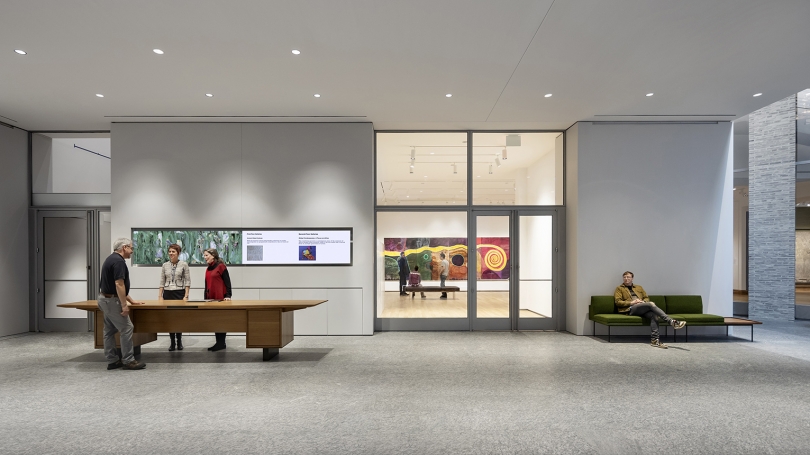
LEFT View of gallery entrance, with the welcome desk to the left. © Michael Moran
Everyone is welcome at the Hood Museum of Art, Dartmouth. We are committed to facilitating the accessibility and usability of our spaces. Please do not hesitate to reach out to us in advance of, or during, your visit so we can assist. Our visitor services staff can be reached by phone at 603-646-2808, by email at hood.museum@dartmouth.edu, or in person at the welcome desk in Russo Atrium.
Large-Print Labels
There are large-print label booklets available in the galleries for a select number of exhibitions. You can view them online here.
Assistive-Listening Devices
A limited number of assistive-listening devices are available free of charge during programs in the galleries and in Gilman Auditorium. Please contact our visitor services staff at 603-646-2900 or inquire at the welcome desk for more information.
Baby Changing Stations
Baby changing stations can be found in the family restroom on the lower level, in the restroom outside of Russo Atrium, and in both restrooms on the second floor.
Food and Water
Food and water bottles are not permitted in the galleries but are allowed in Russo Atrium and can be stored in the locker area during your visit. Water fountains are located inside the galleries on the lower level and on the second floor near the restrooms, as well as outside the Russo Atrium.
Museum Programs
If you need accommodations to participate in any Hood Museum program, please contact Sharon Reed, who will be happy to facilitate or answer questions you may have. She can be reached at 603-646-9660 or by email at Sharon.L.Reed@dartmouth.edu if you would like us to make arrangements for you in advance. If you have a group with special needs and would like to schedule a private tour, please email hood.museum.tours@dartmouth.edu.
Restrooms
Restrooms are available in the museum on both the lower level and the second floor. An all-gender/family restroom is available on the lower level as well as outside the Russo Atrium on the first floor. All restrooms are accessible. Please view our gallery map here.
Seating
Chairs and couches are available in Russo Atrium. Some galleries contain benches. If you wish to use a portable stool during your visit, please inquire at the welcome desk or ask one of the visitor services guides stationed in the galleries.
Sensory Bags
Sensory bags are available to borrow from the Visitor Services Desk at no cost. These include noise-reduction headphones, sunglasses, fidgets and visual vocabularies to help ease sensory stimulation.
Service Animals
Service animals are welcome in the museum.
Social Narrative
A Social Narrative provides an illustrated, step-by-step guide on what to expect during a visit to the Hood Museum. Use this Social Narrative to prepare for your visit and a change in routine. Click here to download a PDF or click here to watch a video of its contents.
Strollers and Bags
Baby strollers are permitted in the galleries as long as there is no food or drink in the stroller. Large bags and backpacks must be left in the locker area. A limited number of lockers are available.
Wheelchairs
The Hood Museum of Art is accessible for visitors using wheelchairs and other mobility devices. The north entrance on East Wheelock Street is accessible and there is an elevator available inside the galleries. A limited number of wheelchairs are available for loan free of charge. Please inquire at the welcome desk. Wheelchair-accessible seating is available in Gilman Auditorium.
Questions?
For further assistance, inquiries, or feedback, contact visitor services at 603-646-2900 or hood.museum@dartmouth.edu.